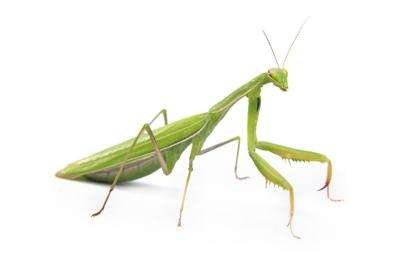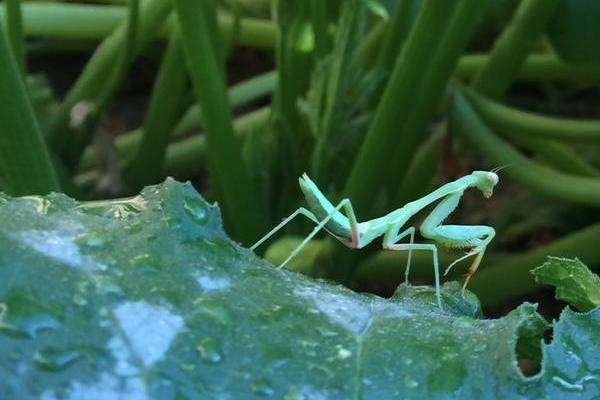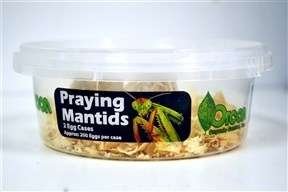
Beneficial Insects, Part II

Garden Superheroes: Praying Mantids
The first in our series about beneficial insects focused on ladybugs and lacewings. They are smaller beneficial insects that prey on smaller pest insects, such as aphids and whitefly. What about larger pests? Is there any way to take care of them with beneficial insects? Yes, there are superhero beneficial insects to take care of those larger pests!
Praying mantids are the powerhouses of organic control in your yard and garden. Adults can control those larger pests like caterpillars, earwigs, sow bugs, beetles, grasshoppers, and other large insects. You read that correctly—a predator for grasshoppers!
Praying mantids are the powerhouses of organic control in your yard and garden. Adults can control those larger pests like caterpillars, earwigs, sow bugs, beetles, grasshoppers, and other large insects. You read that correctly—a predator for grasshoppers!
Our nurseries have mantid egg cases available for purchase. We store them in the refrigerator where it is cold and dark to prevent emergence until they are in your yard.
There is a method for release that greatly encourages success. While it is tempting to put the egg case out in the yard and let magic happen, our gurus say that doesn’t always work. Instead, we recommend letting them emerge under your supervision and then put them where they need to be. How is that done?
There is a method for release that greatly encourages success. While it is tempting to put the egg case out in the yard and let magic happen, our gurus say that doesn’t always work. Instead, we recommend letting them emerge under your supervision and then put them where they need to be. How is that done?
The egg case that holds about 200 mantid babies comes in a little tub with air holes in the lid. Put the closed container in a warm area. This can be inside or outside the home, but not in harsh sunlight. If you place the closed container outside, be sure to place it two feet above the ground. Lightly spray the container with water, but don’t soak the egg case. Check the container each day to see if it needs more sprays of water and see if the young mantids have emerged. Don’t worry, they won’t escape and the air holes ensure they will be safe. The time for the mantids to emerge can vary from one week to four weeks this time of year.
Time for release! These superhero beneficial insects are living organisms that require food, shelter, and water. To make sure they have food, avoid any insecticides just before and just after release. Shelter them from harsh conditions, like sun and extreme heat, by releasing them at night or early in the day. Spray a plant with water so they have something to drink. Once all is ready, take the container to a plant and remove the lid so the newly emerged mantids can come out and get to work. It is best to release them right after they have emerged so they don't rely on each other as a food source.
Congratulations! Grab that superhero cape for yourself. You've earned it.
Read on to learn more about preventative pest techniques: Integrated Pest Management
Read on to learn more about preventative pest techniques: Integrated Pest Management


